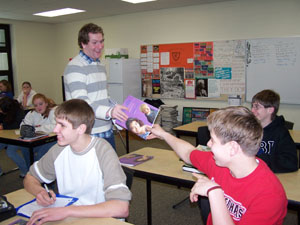By Laura Walker
lwalker@dailystandard.com He started smoking at age 9, and now at 17, smokes a pack and a half a day.

"I know that sometime in my life I want to quit. I need to quit. I just don't know if it is now," he says during a recent Tobacco Education Group (TEG) meeting.
The student was caught smoking in school and as punishment was suspended and must complete eight hours at TEG.
TEG is part of the Mercer County Tobacco Coalition, which for the second year received an almost $90,000 state grant to fund the program and three others. The grant is shared with Paulding County.
To help with the matching funds for the grant and as part of their punishment, students must pay $20 to attend TEG. "This shows students money can be used for better things than cigarettes," says Gateway Outreach Center Executive Director Mike Gause, who oversees all the programs.
Gause says the goal of TEG is to show students they have an addiction and to help them decide to quit.
During a recent four-hour TEG session, students were asked to described how they look while smoking. "Pathetic, not cool, we look like smokers," they answer.
The session also shows how advertisers appeal to the younger crowd. While looking at teen magazine ads for tobacco products, students find advertisements claiming to solve problems, creating an appealing lifestyle and providing total sophistication. The students agree the products do not do what the ads claim.
Statistically, 23 percent of seniors who smoke a pack a day get D's on their grade card, says social worker and instructor Paullette Strine.
At the beginning and end of class, the students test the carbon monoxide levels in their blood. Smoking adds carbon monoxide to the human system, and carbon monoxide reduces the ability of the blood to carry oxygen. After four hours of not smoking, the students experience a lower level of carbon monoxide.
"With the cigarette, you are slowly killing yourself," Strine points out.
Another program funded by the grant is LifeSkills Training.
At a LifeSkills Training class at Coldwater Middle School, students learn how to deal with anger.
The seventh-graders say things that make them angry are siblings, parents saying no and rumors being spread.
Miles Nugent, LifeSkills Training instructor, explains how anger could hurt someone inadvertently.
"When Dad has a miserable day at work, comes home, grumbles about dinner not being right, Mom turns to take her anger out on the kid and the kid has nothing left to do but kick the dog," he says.
Nugent suggests letting anger out by counting to 10, screaming in a pillow, having a vent buddy or sitting down and having a good cry.
"I think it's very healthy to let your anger out, in a good way," he says.
LifeSkills Training reaches 4,000 students in one year, spending $15,000 on student workbooks. In the second year the program already has proven itself, Gause says.
The program teaches life skills, including how to cope with anger and communicate, so student don't turn to things like tobacco and alcohol, he says.
He reports a 1.9 percent decrease in interest in tobacco use, and says, "I wish we could do that with alcohol and marijuana use."
Nugent says the LifeSkills course is about helping students gain knowledge to aid in their growing up, not causing consequences.
"We tell them they have to make their own choices, just like their parents did," Gause says.
Parents do not have a specific role in the LifeSkills Training lessons, he says. It is up to the students if they want to share what they learn with their parents.
Gause says there is a LifeSkills Training representative in all Mercer County schools. Gause explained this is done through a collaboration with the county DARE officers and his network of teachers ranging from college interns to himself.
Other programs offered through the assistance of this grant are:
¥ Stay Tobacco-Free Athlete Mentor Program (STAMP). This program matches high school mentors with seventh-graders. The mentors are living proof that a seventh-grader can survive the next few years without the use of tobacco.
¥ The 5 As Method, a clinical counseling approach to prevent tobacco use in pregnant women. Gause reports this program runs through four obstetrical offices in Mercer County. Gause says the latest quarterly results of the program show 21 women quit smoking during pregnancy, 32 decreased and only four maintained or increased tobacco use. He says Mercer County has a high percent of pregnant smokers and this reduction is significant.
The 5 As are asking the patient about her smoking status; advising on a personal basis the impact of smoking and quitting on mother and fetus; assess the willingness of the patient to quit in the next 30 days; assist, encourage and support in pregnancy-specific smoking cessation materials; and arrange assessment of smoking status. |

